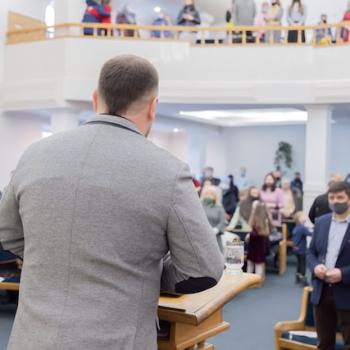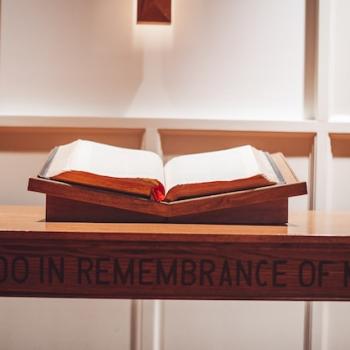Religious structures and systems are not God. And religious authority figures are not God. This is one of those things that feels like it shouldn’t need to be said. But I think it does.
Because the lines between religious authorities and God can get blurry in all kinds of ways. And we need to discern clearly.
A Call From God or From Your Supervisors?
Many years ago, when I was working for a college campus ministry organization, my friend and colleague “Grace” was asked by her supervisors if she would consider moving to work at a different school.
It was more like an hour away kind of move than a cross country kind of move. But it was significant.
It would mean packing up her apartment and leaving everything and everyone she was familiar with far enough away that it would take most of a day (with traffic) to visit. Plus, learning a new campus environment and culture, which always takes a (very long) minute.
I don’t doubt that God sometimes calls people to do things like this. But in this case, I couldn’t help but feel that it was not God calling so much as the ministry organization. They had a staff need they wanted to fill, and they thought Grace was the right person for the job.
There’s nothing necessarily wrong with this. Companies ask people to move for work all the time.
What I remember feeling uncomfortable with, though, was the way all of this seemed to get jumbled together: Staffing needs. God’s call. Supervisors’ requests. A divine invitation into something new. All in one big confusing mix.
In more cynical terms, I remember feeling suspicious that the ministry organization was trying to frame something as a call from God on Grace’s life that was really just their own best attempt at having enough staff at all the different schools.

How was Grace supposed to process this? How was she supposed to discern the difference between the voice of God and the voice of her supervisors, when her supervisors seemed to have no moral qualms about acting as if they spoke for God?
Grace did end up moving. I’m not sure I would have done the same.
Refusing to Fuse Leaders With God
I drew on author Julie Rodgers’ work in my post “A Crisis of Authority,” and I’d like to quote from her again here. Rodgers reflects on her own journey with clarity and insight that I’ve found helpful as I process mine.
In her memoir Outlove: A Queer Christian Survival Story (Broadleaf Books 2021), Rodgers writes this:
I could accept the possibility that humans misled me because of their personal biases. We are all products of our context, and if I had gone on to become a leader in ex-gay circles, I would’ve perpetuated the same toxic narratives. It’s not hard to have grace for human flaws. What confused me was the way I had fused Evangelical leaders with God. I truly believed God spoke to me and told me things that I am now certain God never said to me. What I understood to be God’s voice was Ricky’s voice or my mother’s voice, an echo of the human voices I valorized. How could I discern God’s voice then?
Fusing religious authority figures with God. Confusing evangelical leaders’ voices with God’s voice.
This is what some authority figures (can we stop following these ones, please?) want from their followers. Others wouldn’t necessarily say that’s what they’re going for—but they don’t exactly try to stop it from happening, either.
Many, like Grace’s higher-ups in our campus ministry organization, lurk in the murky middle, leaving things ambiguous. Where exactly was God in the midst of their own requests and orders, based on their own interests? How do we sort these things out? The answers were unclear.
I’m all for having grace for our very human religious authority figures, as Rodgers writes. We can forgive these leaders for the mistakes they have made, even as we also may decide that some of these mistakes are serious enough that we no longer want to operate under their leadership.
But if we’re ever going to have a chance of developing a healthy view of churchy authority, we have to unfuse authority figures from God in our minds and spirits.
Relating to Churchy Authorities Who Are Not God
Authority figures, at their best, listen to God and to people. At their best, they make wise decisions. What they suggest may be good for us—whether it’s moving an hour away, or whatever else it might be.
But they also make mistakes. They might suggest something that isn’t actually good for us. They might be wrong about something in a way that harms us. When this is the case, we can disagree. We can resist. We can speak our own truth, make our own choices. They are not God.
The Hebrew scriptures are full of talk of idolatry, and many evangelicals seem to have some very specific ideas about what that means. We might think of making work an idol in our lives, or romantic relationships, or success, or popularity.
I don’t know that I’ve heard many evangelical leaders talk about making an idol out of religious authority figures. But this is what we do when we follow them mindlessly, trust their judgment over our own, rely on them to think for us instead of thinking for ourselves, depend on them to “authorize” our choices rather than learning to authorize ourselves.
In the religious universe I want to be a part of, religious structures, systems, and leaders:
- Support individuals’ freedom to follow their consciences and their (hopefully ever-evolving) sense of God’s presence and guidance in their lives.
- Offer wise guidance but are very open to being challenged by people’s life experiences, shown where they may have missed something, and otherwise being the fallible humans we all are.
- Encourage people to live lives of love and justice, with great openness for the variety of forms this may take for different people and communities.
- Don’t try to control, but do try to support, empower, and connect.
- Want to be respected, as we all do, but don’t want to be idolized.
I’m not interested in following the leadership of those who don’t mind if I confuse their own callings with God’s.
I am interested in unfusing religious structures, systems, and leaders from God. I’m interested in learning to hear that still small voice that spoke to Elijah and still speaks today, no longer drowned out by all the other voices that are a little too quick to want to tell me what to do.












